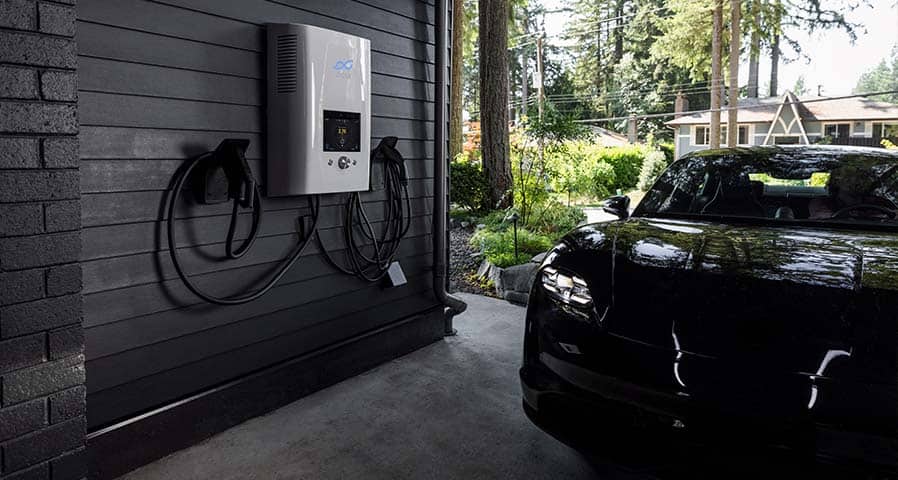Most owners of electric vehicles (EVs) and plug-in hybrid electric vehicles (PHEVs) use a Level 1 or Level 2 charger for overnight charging at home. Home EV chargers are often installed in garages, but some are located outside. It is safe to install a home EV charger on the outside of the home. You can even safely charge your EV overnight, outdoors in the rain.
If you are interested in installing an EV charger at home, here’s what you should know.
Installing an EV Charger at Home
EV drivers can usually meet their range requirements with a Level 1 charger by plugging their vehicles in overnight. Most home garages come with a compatible power outlet, so you can skip installation costs. It also means you are not paying for additional equipment. Unfortunately, it can take up to 15 hours to fully charge your EV with a level 1 charger.
Level 2 chargers are another home EV charging option and a good choice for drivers with erratic schedules or longer routes. Owners of vehicles with larger batteries may also want to consider installing a Level 2 EV charger. The chargers also come with standard safety and status features that help homeowners track energy usage and charger status to name a few.
Some homes may not have the energy capacity to support Level 2 charging. An electrician can add circuits to support the charging station.
State and utility providers often offer incentives that can help offset the cost of installing home EV charging infrastructure.
Apogee Charging Solutions offer commercial grade charging speeds at home. Plus, we have electricians across the U.S. that are EV charger certified to make installing your new Level 2 charger a breeze.
Regulations for Home EV Charging Infrastructure
EV charging infrastructure must comply with local, state, and federal regulations and electricity codes. Permits from local building authorities may also be required. The Alternative Fuels Data Center Codes and Standards Resources page can provide the necessary information for your location.
Your electrical contractor should be familiar with the National Electrical Code (NEC). It provides a guide for safe and regulation-compliant EV charging infrastructure. It’s a good idea to review NEC Article 625 before installing an EV charger at home.
Some areas also require homeowners to submit a plan to the permitting authority before installing a home EV charger.
Electricity Costs for Home EV Charging
EV fuel efficiency is measured in kilowatt-hours (kWh) per 100 miles. The cost of electricity is calculated in dollars per kWh. It allows you to see the cost per mile of the EV and measure the vehicle’s efficiency.
For example, If electricity costs ¢10.7 per kWh and the vehicle consumes 27 kWh to travel 100 miles, the cost per mile is about $0.03.
Using the same formula, charging a 200-mile range EV costs around $6. The formula is based on the cost of charging a fully depleted battery. You can learn more about fueling costs at the Vehicle Cost Calculator.
To learn more about home EV charging the report Comparing Energy Costs per Mile for Electric and Gasoline-Fueled Vehicles will provide additional information.
Home EV Chargers with Apogee Charging Solutions
We understand the excitement of getting a new vehicle, but there are still a lot of charging questions for those purchasing their first electric vehicle. Let the experts at Apogee Charging Solutions assist you with your home charging needs. We are a one stop shop, with commercial speed home chargers, permitting, electrical upgrades, and installation by a certified electrician.
To speak with one of our home charging experts, call 484-816-2076, emailing [email protected], or schedule a call that fits your need by clicking the button below.








0 Comments